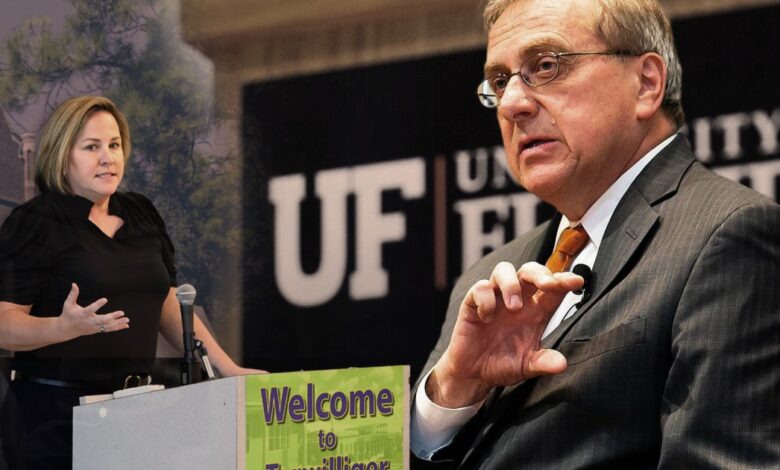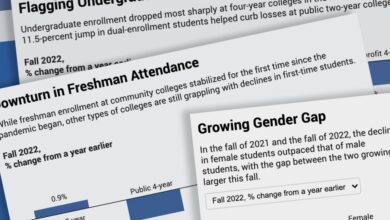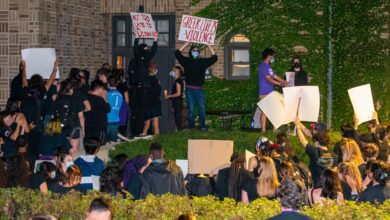In Gator Nation, a President Who Won’t Bite

In a moment of crisis, this city has tapped for guidance its most valued natural resource: the doctors, scientists, and public-health experts who have settled in a college town of some 135,000 people, earning the trust of its leaders. The university’s experts are all telling school officials the same thing: Mandate masks now.
By a vote of 4 to 0, the School Board of Alachua County on August 17 approved the mask–mandate extension. In so doing, the board members put themselves at odds with Ron DeSantis, the state’s Republican governor, who, through executive order and law, has sought to block any public school or college from requiring students or employees to wear masks or to be vaccinated. To that end, Richard Corcoran, the state’s education commissioner, is threatening to withhold funding from the Alachua County school system in an amount commensurate with the offending board members’ monthly salaries.
As some public-school officials see it, they’re engaged in the kind of “good trouble” that the late John Lewis, a United States congressman and civil-rights activist, said that people of conviction ought to get into now and then. Up to this point, however, one man has been conspicuously absent from the fight: W. Kent Fuchs, the University of Florida’s president.
Fuchs (pronounced “Fox”) is not mandating masks. He’s not mandating vaccinations. He’s not bucking the system. He’s not doing what the university’s physicians and scientists have told local school officials that they absolutely must do, now that the more-contagious Delta variant is on the loose: Mandate masks. No exceptions. Consequences be damned.
The disconnect between the school system and the university has cast their respective leaders as the unwitting stars of a morality play. In the spotlight is Carlee E. Simon, the 45-year-old Alachua County school superintendent, who, on Tuesday night, calmly held court with Anderson Cooper on CNN, defying the governor with an air of plainspoken confidence that bordered on the blasé. Fuchs, a 66-year-old engineer with a degree in divinity, has of late inhabited a smaller share of the stage, telling faculty members at a recent virtual town hall that he is powerless to mandate masks on the campus where he is president.
“I literally don’t have that power,” Fuchs said.
These are the optics, and they are not in dispute: The local school superintendent has the power; the president of the sprawling, public research university up the street does not.
The differences in how this city’s two foremost education leaders have approached the politics of the pandemic have invited comparisons of their backbones and bravery. A deeper examination, though, paints a more complicated picture. As governors, lawmakers, and politically appointed board members tighten their grips on public universities, presidents are coming to terms with what they perceive to be their diminished authority — even when the stakes could be life or death.
“As a father, a pediatrician, and a physician-scientist, I challenge you all to do what is right for our kids and continue universal masking in our schools,” he said.
As Schatz concluded his remarks, a couple of people in the audience snapped back, voicing opposition to the mandate.
“The vaccine is spreading the virus,” a person said. (It is not.)
Another professor at the university told the board that failing to mandate masks would be “catastrophic.”
It was impossible to listen to that uniform advice, Simon said in a recent interview, and not extend the mandate, despite the clear political risks. (Fuchs declined an interview request.)
“We do not want to be responsible for anybody’s death,” Simon said. “We don’t want to be responsible for anybody’s serious health issue. All of us want to look in the mirror every night and feel proud of the work we do.”
Presumably, the university experts, who moved the board to act, are giving campus leaders the same advice they gave the school board — only to hear that nothing can be done. (Schatz, in an email to The Chronicle, confirmed that he would like to see a mask mandate on the university’s campus.)
For Simon and the school board, the consequences have been swift. During an emergency meeting on August 17, the State Board of Education directed the education commissioner to investigate Alachua, as well as Broward County, for mandating masks in possible violation of the law. In June, DeSantis signed into law the Parents’ Bill of Rights, which says that parents have the right to “make health-care decisions” for their children. In July the governor issued an executive order that directed the state’s education and health departments to craft emergency rules that ensure Covid-19 mitigation measures “do not violate Floridians’ constitutional freedoms.”
Simon and Alachua County’s School Board say that the district’s mask mandate, which allows children with doctor’s notes to opt out, does not violate any Florida law. But a challenge was to be expected, and threats from the state to withhold money or even to try to remove local board members have escalated. In such an environment, Simon said, education leaders at every level are having to weigh whether to risk their jobs or compromise their ethics.
“That is a horrible place for us to put our leaders,” she said, “and it’s disappointing that we are even allowing it.”
Simon said she had not spoken with Fuchs about his decision not to mandate masks on campus, but she has a good sense of what the university’s president is up against.
“There are enormous amounts of pressure that are coming from outside forces,” Simon said. “My assumption would be that the university is feeling those same pressures, and they’re making decisions based on that.”
There is no clear path for DeSantis to fire Simon, absent somehow stacking the board with political allies. (The governor, who can fill vacancies on the school board, last week used that power to appoint Mildred Russell, the co-founder of an evangelical ministry, who has a history of supporting Republican candidates.)
Fuchs, on the other hand, might not last long in the job if he thumbed his nose at the governor. The power to remove him resides with the university’s Board of Trustees, whose members are nearly all appointed by the governor or the State University System’s Board of Governors. The system board, to which Fuchs also is accountable, is composed almost entirely of gubernatorial appointees. (The education commissioner, who is investigating Alachua County, is also a member of the Board of Governors.)
In Fuchs’s town hall last week, the president boiled it down bluntly: I can’t oppose the state; I am the state.
Sure, Fuchs said, he could send out an email tomorrow that declared a mask mandate, a vaccination mandate, and an immediate move to online instruction. Here’s what would happen: “Within hours, another message would go out from someone to everyone, again saying we’ve been informed that there will be no such mandate. We’re part of the state government.”
Fuchs’s example needn’t have been cast as theoretical. It has already happened.
On a Friday afternoon this month, the university’s vice president for student life sent out a campuswide email saying that some courses could be moved online for the first three weeks of the term to allow students more time to get vaccinated. That night, hours later, Fuchs backtracked.
“In efforts to manage the pandemic’s effects on university life, there have been discussions about moving some courses online for the first three weeks of the semester,” Fuchs wrote, according to a report in The Alligator, the student newspaper. “The decision was made today that UF will not pursue that option, nor will any other university in the State University System.”
The reversal again invited a contrast between the university’s leader and Simon, the local superintendent.
“Carlee Simon is standing up for what she thinks is right,” said Meridith Miska, co-president of Graduate Assistants United, a union representing graduate-student employees. “Fuchs is trying to keep his job.”
Mostly wearing masks, the students crammed together in a long line, placed their orders, and then entered the amorphous purgatory of the “pick-up” area. Frankly, this all would have gone more smoothly if Bella had picked up her order by now. But no one could seem to find her.
“Bella,” an employee called, at first politely. “Bella!”
A beat.
“BELLA!!!!!”
(In Bella’s defense, Brendan was pretty slow on the uptake, too.)
For all of their wide-open spaces, college campuses are riddled with bottlenecks. Buses and restaurants are one thing. Area bars, over which the university has no control, are another. At UF, there’s also Ben Hill Griffin Stadium, which can hold more than 88,000 people and will be open this football season at full capacity.
To stop the spread of the coronavirus in these potentially tight spaces, the university is counting on students to exercise prudence and common sense. Masks are not required, but fliers everywhere reiterate that they are “expected” indoors. For the most part on Monday, students appeared to be honoring that request, and some of them told The Chronicle that they assumed masks were required in classrooms. (Technically, they’re not.)
The university, which has undertaken a major effort to boost inoculations in the area, has no reliable estimate of how many of its students are vaccinated. The unvaccinated include Jon Sasson, a junior, who on Monday morning sat down maskless at a table in the library and popped open his laptop. Sasson did not frequent the library during the previous academic year, he said, because masks were required. With the mandate lifted, Sasson plans to be here a lot more often.
“I think it’s weird to see people still wearing masks, honestly,” he said. “Seeing people in the supermarket with a mask on is a little strange; it’s like another world.”
Most of Sasson’s friends are also unvaccinated, and he doesn’t plan to get the shot anytime soon.
“I don’t know what’s in the vaccine,” said Sasson, who works as a security guard at a midtown bar. “I don’t know what it is. No one knows the long-term effects of it.”
On Monday, the Food and Drug Administration granted full approval to Pfizer-BioNTech’s vaccine, a move that may nudge more colleges toward mandating the jab. Already more than 800 colleges and universities, including many of the top institutions in the country, have issued such a mandate.
Among students, there is a mix of disappointment and acceptance that more has not been done to make the campus safe. Shams Khurram, a freshman, said he blamed state officials, not university leaders, for the lack of mandates.
“I believe it’s not their decision, and life sometimes sucks,” he said.
Elsewhere across the nation, college leaders are fighting — and sometimes winning — battles over Covid policy. In July a federal judge rejected a challenge to Indiana University’s vaccination mandate, and the U.S. Supreme Court declined to block the requirement. In South Carolina a recent state Supreme Court ruling cleared the path for Harris Pastides, interim president of the University of South Carolina, to reinstate a mask mandate, which he had previously rescinded under political pressure. (The lawsuit had been brought by a professor.)
The only exceptions to the University of Florida’s mask-optional policy are health facilities.
Fuchs has said he cannot mandate masks, but nothing in the Board of Governors’ 2021-22 health policies specifically prohibits such a requirement. In fact, it is curiously challenging to find any official directive from the system’s board or the campus-level trustees on the matter. When asked for such documentation, campus and system officials both cited the system board’s health-policy document, which does not say mandates are prohibited.
Renee Fargason, a spokeswoman for the system board, said in an email to The Chronicle that the 12-campus system’s Covid policies had been “developed with leadership at each of our universities. We are all on the same page.”
Marshall M. Criser III, the system’s chancellor, declined an interview request. Sydney Kitson, the board’s chairman, did not respond to a telephone message left at his office.
Steve Orlando, a spokesman for the University of Florida, said in a written statement that it is “following the law and the guidance provided by the Board of Governors regarding masks.”
Even without mask or vaccination mandates, University of Florida officials argue that they are taking steps to mitigate risks. Faculty members who want N95 respirators in place of conventional masks, for example, can request one from the university.
“We’re not endangering the safety of our students or faculty or staff,” said David C. Bloom, a virologist and chairman of the Faculty Senate. “That’s my strong impression. If I felt like they’re forcing us to go into a place that is not safe, then I think everybody would probably be willing to escalate things.”
Last Friday, protesters gathered outside of Tigert Hall, the university’s central-administration building, demanding that the university require masks and vaccinations. They were joined by Leanetta McNealy, chairwoman of the school board, who called on the university to follow the school board’s lead.
“We are all in this together,” said McNeally, whose remarks were carried on on Facebook Live. “If we want to keep our children safe, if we want to keep them from ventilators, if we want to stay out of the morgue, then these are the things that you need to do.”
“I’m hoping that the leadership at this great institution will follow what we’re doing,” she added. “Be brave, be courageous, stand up; don’t step back.”
In an interview with The Chronicle this week, Tina Certain, the school board’s vice chairwoman, said, “I am frustrated with the path that UF has taken.”
Local schools can mask up kids, custodians, and teachers. At the end of the day, though, everybody’s in the same boat here: Alachua County. The university employs children’s parents and teachers’ spouses. They’re all breathing the same air.
“It would be better for our community as a whole if both the school district and UF had similar protocols,” Certain said. “But, you know, they have a president; we have our superintendent.”
In the days leading up to the board vote on extending the mask mandate, Certain said, she received a call from a university doctor urging her to pass the measure. She can only assume Fuchs has been hearing from the same experts “right here in your own backyard.”
Certain hasn’t spoken with Fuchs about the mandate, she said. She imagined, though, what it might be like to have an audience with him — and to hear him say his hands were tied.
“I probably would be flabbergasted,” Certain said. “I’d probably be speechless, like I am now.”
Source link






